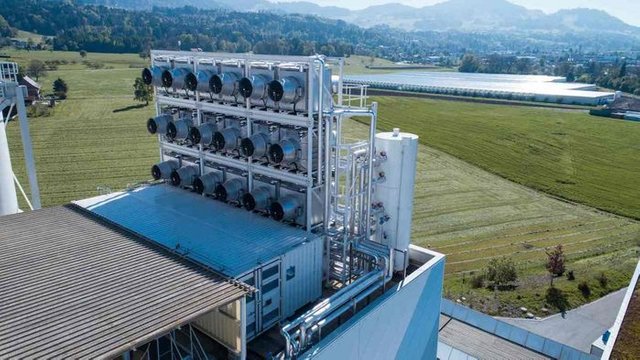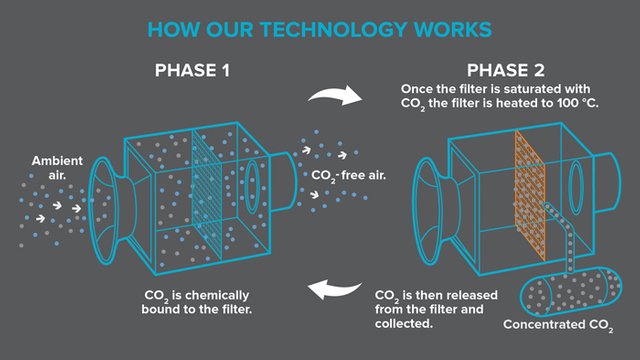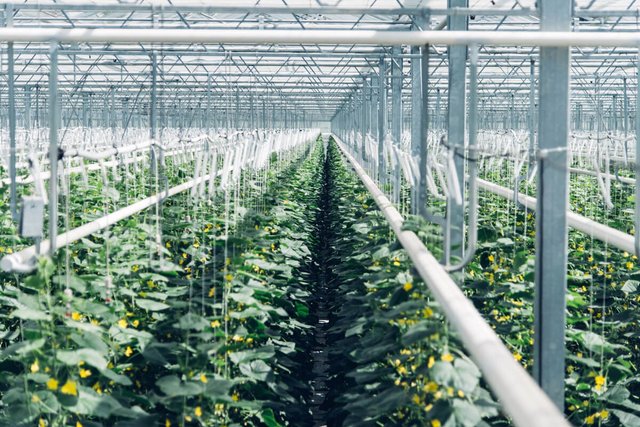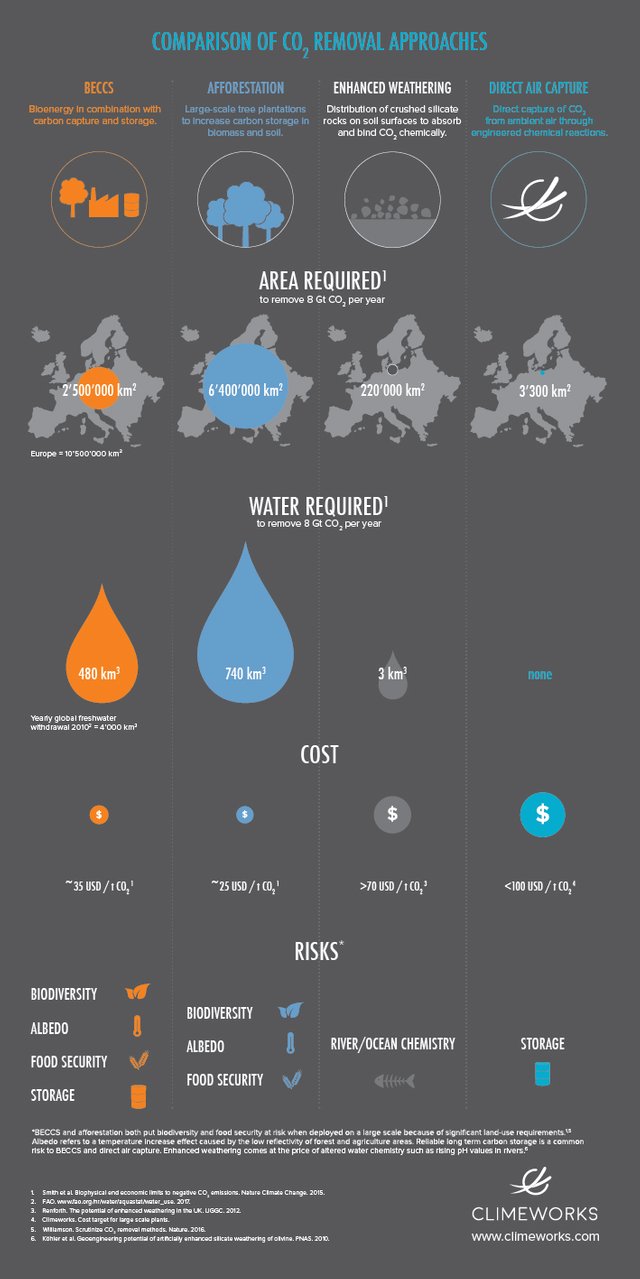Just outside of Zurich, a company called Climeworks AG has become the first ever company to remove CO2 from the air and then sell it to a buyer. Estimates are that the machine will remove 900 tons of CO2 anually - roughly the amount produced by 200 cars in a year - and pipe the gas to customers who grow vegetables. This achievement has reopened the debate about whether technology can play a significant role in removing greenhouse gasses from the atmosphere.
Although the amount of CO2 captured at this plant is but a small fraction of what is released by fossil fuel plants, Climeworks sees this as a first step towards their goal of removing 1% of all the CO2 globally. In order for them to achieve this they estimate that they would need to construct another 250,000 similar plants!
At this plant the CO2 is sent to a greenhouse. In greenhouses farmers carefully control the environment to create perfect conditions for growing crops. By raising the CO2 levels within these greenhouses, the rate of photosynthesis is increased which can boost the crop yield by up to 20%.
"Highly scalable negative emission technologies are crucial if we are to stay below the 2-degree target (for global temperature rise) of the international community," said Christoph Gebald, co-founder and managing director of Climeworks.
How does it work?
The plant is constructed above a heat recovery facility which powers the process. Fans push air through filters which collect the CO2, and once these filters are saturated the CO2 is separated by heating the filters to above 100°C. The gas is then sent via an underground pipeline to the customer. In this case it is sent to a greenhouse which grows fruit and vegetables like cucumbers and tomatoes. However the gas could be used in various other industries, for instance carbonating beverages.
“You can do this over and over again,” said Climeworks co-founder Jan Wurzbacher to Fast Company. “It’s a cyclic process. You saturate with CO2, then you regenerate, saturate, regenerate. You have multiple of these units, and not all of them go in parallel. Some are taking in CO2, some are releasing CO2. That means that overall the plant has continuous CO2 production, which is also important for the customer.”
Sideshow
Critics of air capture technology say that it would be much cheaper and far more efficient to perfect carbon capturing directly at fossil fuel plants and prevent CO2 from getting into the atmosphere in the first place. Senior research engineer at MIT Howard Herzog says "At that price, it is ridiculous to think about right now. We have so many other ways to do it that are so much cheaper." He noted that the cost for air capture is so high partly because the CO2 is diffused in the air, whereas at fossil fuel plants it is far more concentrated and flows in a direct stream.
In 2015, the National Academies of Sciences, Engineering and Medicine released a report saying climate intervention technologies like air capture were not a substitute for reducing emissions. In 2016 it was written in the journal Science that air capture technologies are an "unjust gamble" and take focus away from more viable options for cleaning the air.
Supporters say that it is simply a matter of lowering the costs. More than a decade ago, entrepreneur Richard Branson launched the Virgin Earth Challenge and offered $25 million to the builder of a viable air capture design. Climeworks was a finalist in this competition.
Personally I believe that any step is a step in the right direction when it comes to tackling climate change, and as technology evolves and more efficient combat techniques are found, a huge difference can be made. The irony of it all is that we as humans put all the excess in the air in the first place with technology!
Video Credit
If you enjoyed this post please upvote, resteem and follow me @ollie7!!!
Sources:
http://www.sciencemag.org
http://www.climeworks.com
http://www.bigthink.com
http://www.republicworld.com





Downvoting a post can decrease pending rewards and make it less visible. Common reasons:
Submit
You have been upvoted by the @sndbox-alpha! Our curation team is currently formed by @jeffbernst, @bitrocker2020, @jrswab & @teachblogger . We are seeking posts of the highest quality and we deem your endeavour as one of them. If you want to get to know more, feel free to check our blog.
Downvoting a post can decrease pending rewards and make it less visible. Common reasons:
Submit
Very interesting technology, and an excellent writeup of the same. I had a brief professional encouter with CCS tech a while ago. Whilst there are many promising technologies (like this one) that could help reduce CO2 levels in the atmosphere, there is no driving economic mechanism in place that would lead to effective CO2 reduction on a large scale. Unless industries see that there is a real economic incentive to implement CCS, I believe large scale CCs is never going to happen. The challenge is mostly a political one, not a technological one. Today it is virtyally free (yes there are some small fees and taxes in some countries) to release CO2 into the atmosphere. But if there was a significant cost linked to CO2 release, then I believe we would see change that would make a real impact.
Downvoting a post can decrease pending rewards and make it less visible. Common reasons:
Submit
I would say that I agree. Although the amounts that are being able to be captured now and the use they are being put to are amazing, I think that in the bigger picture it looks to be more of a gimmick than anything else unfortunately. But it is still a step in the right direction. At the end of the day though we can invent whatever technology we want, but if we don’t each change ourselves and the carbon footprint each person leaves behind, we will just carry on p****ng into the wind 🤷🏼♂️
Downvoting a post can decrease pending rewards and make it less visible. Common reasons:
Submit
The Amazon Rainforest is part of this global system and the sun is also the biggest factor in climates in environment and the sun is thousands of times bigger than the earth which means the sun impacts the earth thousands of times more than people do. Plus, we breath out and the trees breath in and we rely on each other and the CO2 thing is a good thing and not a bad thing.
Downvoting a post can decrease pending rewards and make it less visible. Common reasons:
Submit
Indeed, but trees aren't used to this many cars and fuel plants breathing out as well!
Downvoting a post can decrease pending rewards and make it less visible. Common reasons:
Submit
Are there more cars than there are suns?
Downvoting a post can decrease pending rewards and make it less visible. Common reasons:
Submit